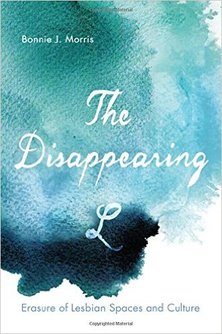
Okay. The book. It’s amazing, Amazonian. It does things that are supposedly not possible. Like lesbians. It’s often warm, personal, and personable… and at the same time impeccably researched and documented. She brings “scholarly standards to radical history.” It’s engaging and accessible, stimulating and inspiring. It’s actually kind of everything.
Dr. Morris lays it right out from Page One, stating in her first sentence that she writes “as a woman, lesbian, and feminist; a dinosaur facing extinction in this new queer jungle. I’m writing now to describe what it looks like and feels like to be written out of history.”
Bam.
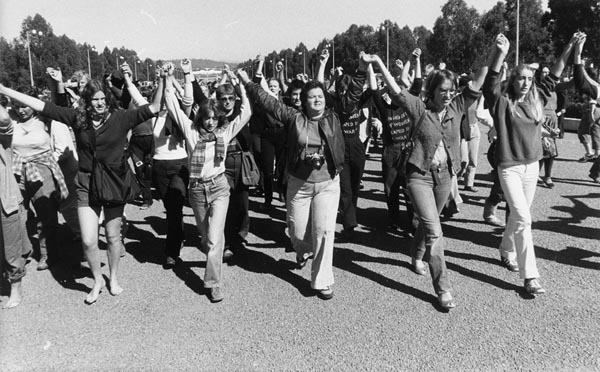
This, of course, did not happen to gay men. Why and how did it happen to lesbians? Dr. Bon, influenced early in life by Nancy Drew and Harriet the Spy, invites us to join her in solving this mystery… and she describes her treasure map:
“As cultural capital, the threatened art and music of this recent lesbian past is precious to me.”
It should be precious to all of us… not just lesbians, but anyone concerned with the rapidly eroding rights of women. Because, as we are seeing, when they came for the lesbians, it was the prelude for the abasement of all women.
Dr. Bon is a professor of women’s studies, and from this vantage point, she has been able to watch the process of erasure. She notes how the terms for identity most popular with her students include “queer, gay, bi, trans, or ally.” What did these have in common? “…they were all either gender-neutral or male-inclusive. These terms embraced masculine possibilities, or relationships with men, in ways that lesbian of course did not.” In this lineup, “lesbian” is read as separatist, and the ignoring of men is nearly always conflated in patriarchy with hatred of men. This image, of course, is anathema to female activists or progressives.
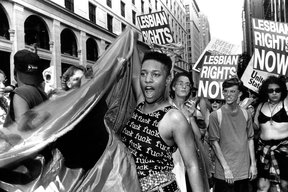
So… that’s where we are. That’s just chapter one. The pundits have drawn an official curtain over three decades of radical, lesbian-feminist social change and a flowering of lesbian and feminist culture unprecedented in the history of the world. But… Nothing to see here, folks. Let’s move along. Dr. Bon cannily uncovers one of the key mechanisms for our erasure: The lesbian stereotype so aggressively propagated erases our activism.
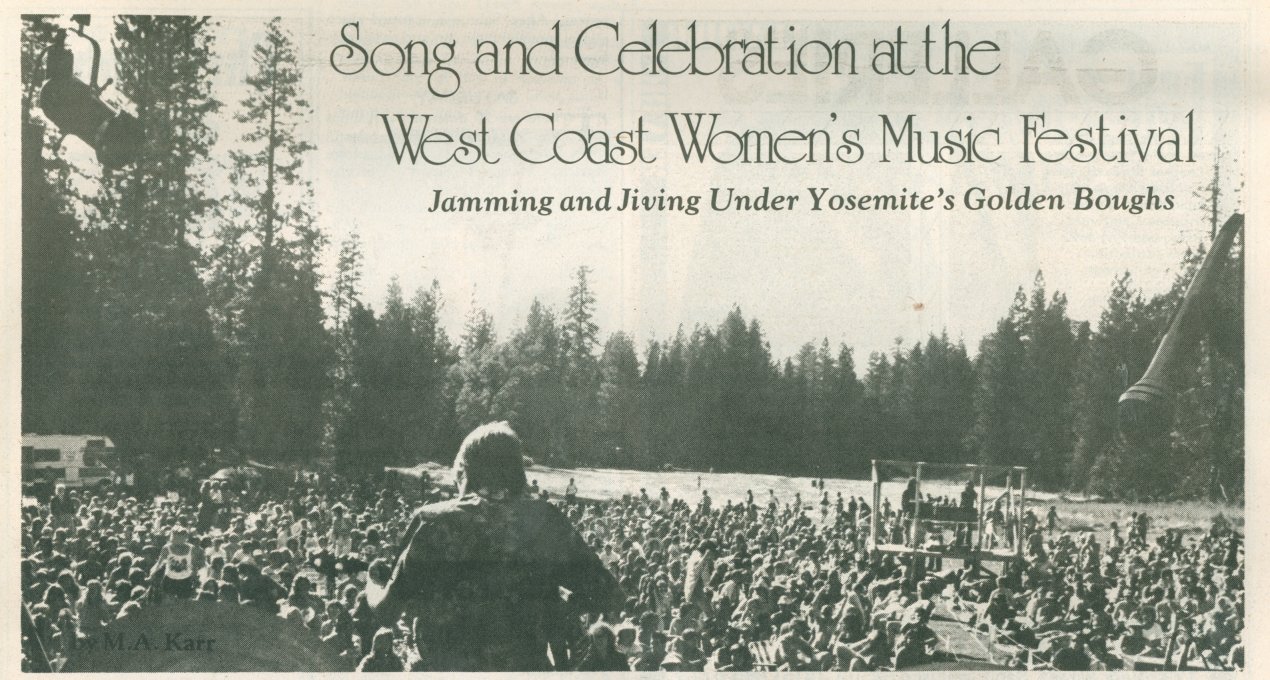
And what about the “women-only” events? What about them…? Wasn’t anybody noting the men-only offerings of the entire rest of the culture. In the words of lesbian photographer JEB (Joan E. Biren), “There was nothing in the culture that nourished us.”
“… so many women were desperate for positive reflections of lesbian life that just to be at a lesbian-majority event was thrilling; actually enlightening. Joining together to create this temporary majority at women-only concerts allowed audiences to experience (for the first time) an environment where lesbians were in charge of what was said about lesbian lives.”
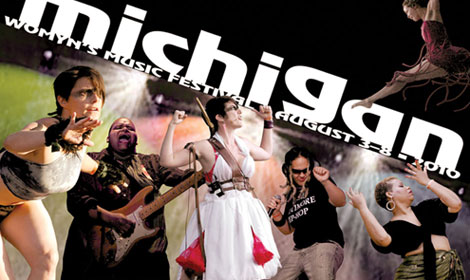
But wait… there’s more. That’s only the beginning. The second chapter, “By the Time I Got to Wombstock.” This is the chapter about the festivals—the women’s music festivals. As Dr. Bon notes, “Thousands and thousands of lesbians experienced at least one such festival as part of their personal and political awakening in the quarter-century between 1974 and 1999.”
I remember so clearly my first festival. It was the West Coast Women’s Music Festival, produced by Robin Tyler. It completely rocked my world. It changed me forever. Later I would attend the West Coast Lesbian Festival, the East Coast Lesbian Festival, Campfest, the Gulf Coast Womyn’s Festival, and the Michigan Womyn’s Music Festival. I went to “Michfest” for fourteen years, contributing programming to it for nine.
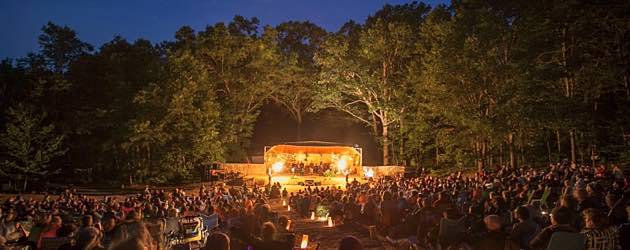
My experience of these festivals is so outside the context of everything to do with the patriarchy that I am at a loss for words in describing it. What I would say for the last quarter century was just “see for yourself.”
But Dr. Bon finds the words:
“Were festivals designed to be lesbian erotic vacation spaces? Or were they reflective, goddess-centered spirituality breaks from rampant sexism and homophobia in society? Or training camps for lesbian political nationhood? …Against this backdrop of recovery meetings and nude partying, hopeful diversity and angry processing, the nation’s best all-female stages evolved over time, a music and comedy performance history that should be central to any reconstructed narrative.”
She cites Robert McRuer in his research on gay and lesbian utopian communities:
“The emphasis for many lesbian feminists had shifted from engagement with, or transformation of, the outside world, to removal from that world and the structures of patriarchy and capitalism that sustained it… despite the fact that it was an outdoor event, the spatial orientation at women’s music festivals was inward.”
This subject is so charged for me, I am overwhelmed just attempting to review the writing of another author! All I can say is thank the goddess for Dr. Morris. Seriously. She has chronicled assiduously forty years of the jewel in the crown of lesbian feminist culture, and in this chapter, she presents us with a comprehensive history of the roots of the festivals, the lineups of performers, profiles of the largest one, and an in-depth analysis of the controversies surrounding the Michigan Womyn’s Music Festival.
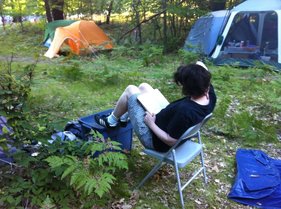
She shares with us the tender pages of her journal of the experience, beginning with the eighteen-hour road trip on a privately chartered Greyhound bus. In spite of the all-night party on the bus and being rained out of her tent, her relationship with festival culture was consummated on that trip: “This is my life choice. I have been silent because so much of what I feel has already been expressed so eloquently by others before me in this movement. But I want to capture it all, for it has captured me.”
O, sweet bird of youth… I wish that starry-eyed nineteen-year-old could have known what awaited her… a hundred festivals, thousands of women, hundreds of thousands of words. By 1986, her graduate school training had put her well on her way to being a professional historian. Her note-taking expanded into tape recordings. Eventually, she began to invite women at the festivals to journal along with her.
These journals were so much more than “dear diaries.” In Dr. Bon’s own words:
“In creating a longitudinal festival journal before women had computers, blogs, Twitter, or Facebook, I ended up with an archive of how self-worth developed in a marginalized community.”
What she was documenting was a miracle.
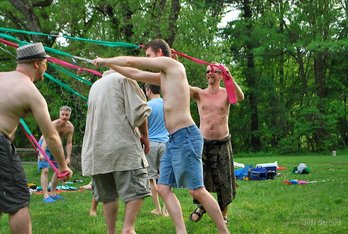 Radical Faeries May Day Gathering
Radical Faeries May Day Gathering And we were not gays. We were lesbians, specifically females. On top of the homophobia, we were combating the ubiquitous misogyny that too often considered rape, battery and harassment to be our fault. But we found each other, we began to share our stories, and then we celebrated ourselves. These celebrations were not just part of a movement toward liberation. They were an embodiment of the liberation itself. Radical beyond description… except that Dr. Bon was doing just that.
Why no coverage? Aside from the obvious biases against women and homosexuals, Dr. Bon offers and additional explanation: AIDS. She notes how the Radical Faerie movement of the 1980’s, a movement among gay men, embraced separatist retreats in nature as part of identity-building. This generation, however, was ravaged by the AIDS epidemic. The heyday of lesbian culture coincided with the plague years for gay men, and, as a result, many of the men who were in sympathy with this culture and who might have been able to provide a supportive context for it for future historians did not survive.
Then, there is the rise and fall of the lesbian-owned businesses, especially the women’s bookstores, which were sanctuaries and clearing houses for entire communities of lesbians.
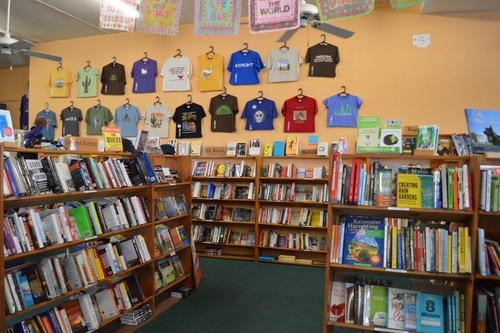 Antigone Bookstore in Tucson
Antigone Bookstore in Tucson “In the realm of social media and political rhetoric, [women born female] lesbians and trans women were cruelly set against one another in the ongoing battle over the Michigan Women’s Music Festival. This has successfully rewritten recent history to portray lesbian cultural activists as both privileged and oppressive, burying other realities.”
Unlike most of those who write on this subject, Dr. Bon was actually there. She was there for nearly forty years.
The Disappearing L has a fascinating chapter “Imagining an Eruv,” where Dr. Bon documents the history of Jewish lesbian-feminists in the lesbian culture. She talks about the struggle for a separate “Jewish Tent” at the Michigan Festival, the eventual realization of that dream, and then the permutations of that institution. Drawing parallels between the identities of Jews and lesbians, she compares strategies for preservation of culture.
The Disappearing L is so rich in detail and anecdote, so enlightening in analyses, I am at loss to do it justice. This book, and Dr. Bon’s archive, which is at the Schlesinger Library, are treasures. I feel blessed to have been a part of this time, this culture, and to have walked with so many of these women… and I feel blessed that someone has preserved the record and the artifacts of this “Golden Age.”
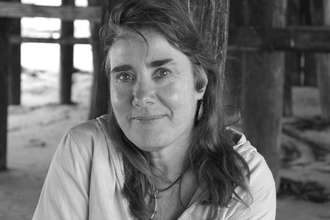 Dr. Bonnie J. Morris
Dr. Bonnie J. Morris From Dr. Bon's website:
A lifetime of teaching women's history.
Q: IS SHE STILL CARRYING THAT NOTEBOOK AROUND?
A: Yes--and still writing in it with a fountain pen.
Q: How many journals has Bon filled by now?
A: One hundred and seventy-nine; they jam the bookshelf my father built for me when I was three. On my table, catching sunlight and moonlight, is a bowl of fountain pens. Come choose your weapon: Sheaffer, Lamy, Watermark.
"My research interests and available guest speeches include women's sports, the women's music movement since the mid-1970s, Jewish women's history, and other female-identified communities across time....
I've traveled the world as a professor and guest speaker. Appearances include both University of Waikato and Victoria University in New Zealand; Reykjavik University in Iceland; the Women's Education, Reserach and Resource Center of University College in Dublin, Ireland; Tel Aviv University in Israel; Queens College in Ontario, Canada; and Anna Daresh Women's College in Madras, India. Bring me in to speak at YOUR next women's history event!"
The Disappearing L can be ordered from the publisher for $22.
And here's an interview I did with Dr. Bon, sponsored by Green Woman Store for their telesummit on the environment in 2015.

 RSS Feed
RSS Feed
